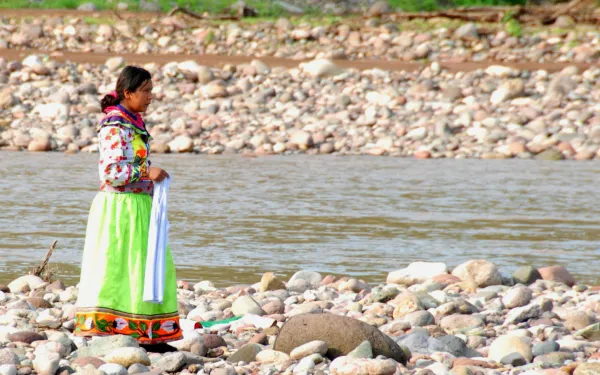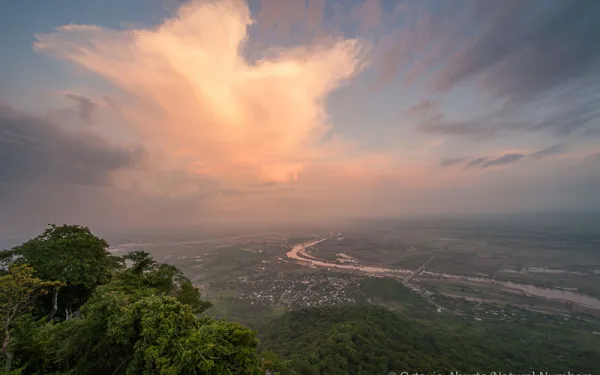
Project
Photo: Ana Rodríguez Carrington (CC BY 2.0)Victory: Biosphere Reserve in Baja California Saved from Toxic Mine
Known as an “ecological treasure house,” the Sierra La Laguna Biosphere Reserve at the southern tip of Baja California will not be spoiled by toxic mine waste, thanks in part to AIDA’s advocacy.
The reserve was once an island, so it’s home to rare plant and animal species. Canyons, swimming holes, and hot springs can be found in its granite mountain range and lowland tropical forests.
Thanks to AIDA and our partners in Mexico, the Mexican government denied an environmental permit for the Paredones Amarillos gold mine, halting the project for the time being. To protect the biosphere reserve, AIDA helped educate community groups and decision makers about the mine's risks. This helped to build the political momentum necessary for the government to deny the permit.
To extract gold from the mountains, the Canadian company Vista Gold proposed to carve out huge quantities of rock—each ton containing a mere gram of gold–-grind it into sludge, and treated it with cyanide. The company planned to dump massive amounts of toxic waste (called “tailings”) behind a dam intended to store it forever. Unfortunately, tailings dams can break for various reasons, as happened at Bolivia’s Porco mine in 1996. When that dam collapsed, more than a quarter million metric tons of tailings flooded the river and contaminated 500 miles (800 km) of waterways in Bolivia, Argentina and Paraguay.
The mine could also cause acid mine drainage. When sulfur-containing rocks are exposed to air and water, sulfuric acid forms, which causes toxic heavy metals to dissolve and drain into the watershed. The risk of acid mine drainage in Sierra La Laguna was significant and the human and environmental cost would have been tremendous: thousands of people and countless wildlife in the reserve rely on its water for survival.
Depleting freshwater is a further threat because mines use tremendous quantities of water. Owing to the scarcity of water in the reserve, Vista Gold proposed to build a plant on the Pacific coast to remove salt from sea water in a highly energy-intensive process, and then pump the water 45 km to the mine site. The desalination plant posed a threat to the endangered leatherback sea turtle.
Singly and together, the mine’s impacts would have devastated a rare jewel, a unique and lush paradise worth saving for future generations.
Related projects

Indigenous groups ask Pope Francis to help stop Las Cruces Dam
In a letter delivered to Vatican representatives, indigenous and riverine communities affected by the construction of a dam on Río San Pedro Mezquital asked that the Pope intercede on their behalf before the Mexican government during his visit to the country. They explained that the hydroelectric project would cause serious harm to the environment and human rights. Mexico City, Mexico. On the occasion of Pope Francis’ visit to Mexico, indigenous and riverine communities from Nayarit state wrote a letter asking the Pope to intercede on their behalf before the Mexican government, in hopes of putting a stop to the Las Cruces Dam project on Río San Pedro Mezquital. The project, they explain, puts at risk their culture and way of life, and also threatens Marismas Nacionales, one of the country’s most important wetlands. The letter was delivered to the local headquarters of the Apostolic Nunciature, a diplomatic mission of the Vatican. It reads: … We respectfully solicit that you, Your Holiness, during your visit to our country, intercede on our behalf before President Enrique Peña Nieto, so that his Government stops the human rights violations of all indigenous communities in the name of development, and that it abandon further advancement of the Las Cruces hydroelectric dam because of the human and environmental impacts it will cause. Mexico’s Secretary of the Environment and Renewable Natural Resources (SEMARNAT) has granted environmental permits and water rights for the construction and operation of the dam. “They did so without having guaranteed the right to prior consultation of the indigenous communities affected by the project, which include the Náyeri, Wixárica, Mexicanero and Tepehuano peoples,” explained Sandra Moguel, AIDA attorney. “SEMARNAT authorized the project with the condition that the Secretariat of Energy realize a process of consultation with the indigenous communities, which should have been done before issuing the authorizations.” In their letter, the indigenous communities honor and celebrate Pope Francis’ encyclical, Laudato Sí, in which he recognizes the important contribution indigenous communities can make towards the promotion and protection of culture and natural resources. “The Río San Pedro is not simply part of our lives, but also fundamental to our spirituality,” explained Julián López Cánare, member of the Náyeri Indigenous Council, who delivered the letter. “All of its territory, from its headwaters to its mouth, is a sacred space where we strengthen our identity and values.” This river also feeds Marismas Nacionales, one of Mexico’s most important wetlands. The area is recognized as a Biosphere Reserve and a Wetland of International Importance under the Ramsar Convention, an intergovernmental treaty for the protection of wetland ecosystems. Finally, the indigenous communities explained in their letter that the pressure put on them to agree to the project has escalated to include harassment and illegal detentions by the government. They also cite instances of acts simulating consultation, which would not be valid considering the project has already been authorized. Citing the visions for the future they share with Pope Francis, the letter finished: Your Holiness, hopeful in the power of your intercession, we part here with the passionate hope that your encyclical letter, Laudato Si’, inspires and propels profound changes in politics, practices, and beliefs of governments, businesses, civil society, and the mentality of our fellow man, with hopes of constructing a more just, more humane, and truly sustainable world.
Read more
AIDA celebrates Court decision to protect Colombia's páramos
Colombia’s Constitutional Court on Monday declared unconstitutional an aspect of the country’s National Development Plan that permitted mining in páramos. Bogota, Colombia. The Interamerican Association for Environmental Defense (AIDA) celebrates the decision of Colombia’s Constitutional Court to ban mining in the country’s páramos. The ruling—which nullified an article of the 2014-2018 National Development Plan protecting previously granted mining licenses—is vital to the preservation of Colombia’s freshwater resources, and should serve as an example for other countries in the region. AIDA and partner organizations presented an amicus brief in support of the corresponding lawsuit, filed by the Cumbre Agraria, Campesina, Étnica y Popular. The court’s ruling brings justice to these important freshwater ecosystems and the many people that depend upon them. Although they occupy just 1.7 percent of the national territory, Colombia’s páramos provide 70 percent of its fresh water. The sensitive ecosystems are also strategic reserves of biodiversity, and act as carbon sinks essential to the mitigation of climate change. The high court’s decision is key to the protection of the Santurbán páramo, on which hundreds of thousands of people in the Bucaramanga metropolitan area depend. AIDA has long been working to defend Santurbán from large-scale mining and to provide support to affected communities. AIDA urges the Ministry of the Environment to promptly enact the court’s ruling and protect all the country's páramos from the impacts of large-scale mining operations.
Read more
Worth Protecting: Mexico’s Marismas Nacionales
By Anna Miller, AIDA writer On Mexico’s northern Pacific coast, verdant mangroves reach their roots into the shallow soil, drink up the sweet, fresh water flowing from the mountains, and shelter the diverse, abundant life teeming below. Crabs crawl along the muddy ground, fish zig and zag along the root systems, crocodiles wait patiently in the shallows, and sea turtles feed on their way to coastal nesting grounds. This living, breathing community, extending 2,000 square kilometers through Nayarit and Sinaloa states, is the largest mangrove forest on Mexico’s Pacific coast. Despite the importance of this rich environment, the Marismas Nacionales are at risk. Their health and vitality are threatened by the proposed Las Cruces hydropower project, which would dam the Río San Pedro Mezquital, the last free-flowing river in the Sierra Madre Mountains. After the senseless destruction of the Tajamar mangroves in Cancún, Mexico must now, more than ever, live up to its responsibility to preserve vital wetlands like Marismas Nacionales. There is so much worth protecting. The San Pedro Mezquital River is born in the highest peaks of the Sierra Madre, flowing through dense green forests and across valleys before reaching the coastal plains of Nayarit, where its fresh waters feed Marismas Nacionales. Altering the natural flow of the river would increase sedimentation in the wetlands and risk suffocating the sensitive system. The vast coastal wetlands along the Gulf of California are home to as many as 20 percent of Mexico’s mangroves. A sort of biological super system harbors a diverse array fish and birds and insects and amphibians. The Marismas Nacionales are believed to constitute one of the most productive environments in Northwest Mexico. Coastal communities also live in harmony with Marismas Nacionales and depend upon the wetlands for their survival. The coastal marine environment provides a sustainable livelihood for local populations, who fish and harvest shellfish. The communities are therefore linked with the health and wellbeing of the wetlands. An avian paradise, the Marismas Nacionales are home to more than 250 species of birds, nearly half of which are migratory. The Marismas provide a critical wintering habitat for birds from the Pacific coastal region: in parts of the year, 80 percent of Pacific migratory shorebirds take shelter there. Many local species also seek out the mangroves as shelter from surrounding areas during particularly harsh weather. Without a healthy river, the life in these vast mangrove forests and coastal lagoons may be lost for good. With the construction of Las Cruces Dam, Mexico is putting at risk another of its sacred natural places. AIDA is committed to protecting Marismas Nacionales, and the health and way of life of all the living things that depend on them. We hope you’re with us. Learn about our work to stop Las Cruces Dam
Read more